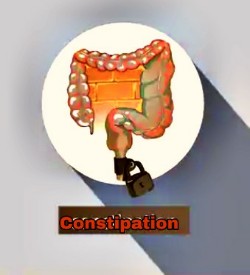Constipation
Approximately 8 to 26 per cent of healthy adults suffer from constipation. The cause of constipation is often found in lifestyles such as lack of exercise, low-fibre diets or insufficient fluid intake.
Constipation is defined as a reduction in the number of stools or the difficulty of a defecation event that is detrimental to daily life. The correct frequency of defecation cannot be determined, but constipation is often talked about if the bowel is empty less than three times a week or if the stool is so firm that defecation is difficult in most cases.
 |
Constipation |
Causes of constipation
Approximately 8 to 26 per cent of healthy adults suffer from constipation. The cause of constipation is often found in lifestyles such as lack of exercise, low-fibre diets or insufficient fluid intake. Repeated stool defecation may also lead to constipation because the bowel rarely "learns" to empty. Many diseases and medications can also cause severe stomach and constipation. When constipation is a new symptom, it is a good idea to investigate the cause.
Self-care for constipation requires patience
Lifestyle changes may be considered as the primary treatment for constipation in healthy adults. Adding exercise to your daily routine, adding fibre to your diet, and consuming sufficient fluids often alleviate the symptoms of constipation. Lifestyle changes should be followed with patience: the effects often start to develop within 1-2 months.
Below we have listed some tips for self-management of constipation. The changes should be permanent so that the symptoms of constipation remain.
Adding the right fibre to your diet
Constipation can be alleviated by adding fibre to the diet. The fibre content of the intestine increases and absorbs liquid such as constipation faeces. The fibres can be divided into soluble and insoluble types of fibre, and since there are large differences between these activities, they should be aware of with the selection of suitable sources of fibre, especially if the background is a functional bowel discomfort, such as irritable bowel syndrome.
Soluble fibre can be obtained from Vi-Siblin, which is composed of berries, fruits, legumes and pharmacy fibre supplements such as ispaghulan seed peel. The soluble fibre is gentle on the stomach.
Insoluble fibre is mainly obtained from cereals. The insoluble fibre in cereals and bran increases the faecal mass and accelerates its passage through the intestine, thus facilitating constipation. However, in many people, insoluble fibre can also exacerbate symptoms. So keep an eye on it - if rye bread does not relieve or even worsen stomach symptoms, its use should be restricted.
Adequate intake of fluids is important in the treatment of constipation, especially if fibre is used. Fluids should be consumed at least two litres a day.
Exercise
Increased physical activity in everyday routines to stimulate intestinal activity. The quality of exercise does not matter: a brisk walk and benefit navigate through the jacket will contribute to the normalization of bowel activity.
Regular defecation rhythm
Teaching the regular rhythm of the bowel, or "session" Scheduling a specific time can teach the intestine to work regularly. Training will continue for several weeks even if defecation is not successful at first.
When to treat?
For constipation, it is advisable to seek treatment, especially if the discomfort has, despite self-medication, become disruptive to everyday life or if constipation develops rapidly (within a few weeks), although the stomach usually functions normally. Similarly, if you have other symptoms besides constipation, such as strange stomach pains or constant tiredness, it is good to seek treatment.

0 Comments:
For more information please comment